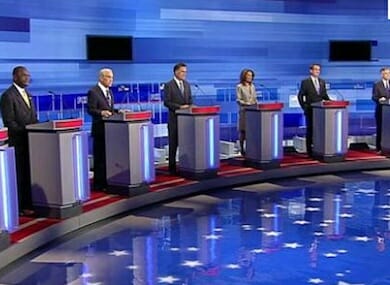
WASHINGTON – As the Republican debate season strengthens over the next two months, emergency managers from Florida to Nevada have urged residents to develop disaster plans and determine whether they live in evacuation zones.
Forecasters are expecting six to seven presidential-candidate debates to hit landfall over the next three months, striking Des Moines, Las Vegas, Rochester, Orlando, Charleston, among others. The National Discussion and Rhetoric Administration released its forecast for the 2011-12 debate season Thursday.
Scientists say as many as twelve named debates may develop before the end of the season. Six to ten of those could strengthen into debates with hot air of at least 78 mph. Three to six could become major discussions, with maximum personal invectives of 111 mph and up. The eleven-month GOP debate season began May 5, 2011 and ends March 5, 2012.
The early part of the GOP debate season was one of the busiest on record with five named debates. Prior to May 5, 2011, no political debate had made a U.S. landfall in three years, but scientists say residents can’t expect their luck to hold.
Some of the early debates were Category 3 exchanges – Debate Greenville, Debate Manchester, Debate Ames – which hammered these areas, pounding tens of millions of Americans with sound-bytes, slogans, and promises.
In South Carolina, the debate word count caused severe inland nausea. Gov. Nikki Haley said damages there could reach “tens of hundreds of dollars.” New Hampshire’s governor called the audio blackout in his state its second-largest ever and warned that electricity might not be restored until the candidates leave.
The three GOP debates’ massive size and slow journey along 1,100 miles of U.S. territory left an extraordinarily broad impact. The discussions contributed to the fainting of seventeen people. Toppled candidates, fallen reputations, and escaping voters caused hundreds of roads to be closed over the weekend. Some 2.4 million people had to be evacuated from cutesy observations and specious arguments.
When asked what the Republican Party might do to mitigate debate damage in the surrounding areas, Chairperson Reince Priebus said, “the GOP recognizes some of the inconveniences caused by candidate debates, but we know the benefits of democracy outweigh the collateral damages.” Priebus added that debates are not a hard science and that no one can predict the category strength of a particular debate “until one of the candidates grows passionate or starts to smell of fear.”
GOP strategist and CNN contributor Alex Newman said, “Debates are also dangerous to top-tier candidates, not just for citizens in the surrounding counties.” Over the years, formerly leading candidates have been stranded and even drowned in waterfalls of innuendo and misrepresentation.
Several computer models gauged the paths of the early debates, but these models exaggerated the data, causing residents to flee at least two debates, which later turned out to be mere topical depressions.
NDRA scientists explain that Category 2 and higher debates can lose energy quickly unless they have the right mix of personalities. “A debate with factors of Bachmann, Cain, and Perry won’t carry as much energy as those that include Paul and Romney. It takes a perfect mix to take roofs off of barns.”
NDRA scientists won’t comment publicly about the possible injection of former Alaska governor Sarah Palin into current slow moving systems. Palin has made numerous visits to the crucial early voting caucus and primary states, leaving a wake of broken branches behind her. Palin told supporters Friday that, “I always think that there’s room for extratropic and baroclinic releases because poleward cycles and vortex winds will allow even better rip tides and high wind warnings that the public deserves.”
Emergency managers offer the following advice if you learn of a presidential-candidate debate in your area:
1. Keep informed about shelter information in your area. Make sure the shelters lack cable TV and internet connections.
2. Develop a plan for evacuation. Decide where to flee, what to take, and whom not to tell about your location.
3. Prepare a family communication plan. Designate an acquaintance or relative far from the area to be struck by the debate as your family contact. Check their party affiliation. Independents are preferred.
4. Help prepare the elderly, disabled, the well-educated, and anyone who regularly yells at his or her television.
5. Assemble a disaster supply kit that includes first-aid kit, ear plugs, foil glasses, holy water, change of underwear, and a copy of the Brothers Karamazov.
6. Gather important documents or copies: will, deed, copy of U.S. Constitution, photos of pets, Pictionary, and bribe money.